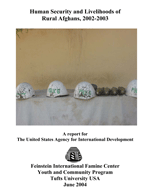This report documents and analyzes recent countrywide trends in the relationship between human security and livelihoods throughout rural Afghanistan from 2002-2003. All countrywide information is generated by analyses of 2003 Nationwide Risk and Vulnerability Assessment (NRVA) survey data. All analyses of NRVA data, unless otherwise noted, are conducted by the Tufts University team. In addition, the report includes detailed analyses on six provinces based on primary research by the Tufts team in Badghis, Balkh, Herat, Kabul, Kandahar, and Nangarhar.
The report emphasizes the important links among four key aspects of human security—human rights and personal security, societal and community security, economic and resource security, and governance and political security—in the livelihoods of rural Afghans and the prospects for peace and development in the country in the longer term. The report also examines and analyzes the formal, traditional, and customary mechanisms that are in place to address injustice and mitigate security and livelihood threats for the rural Afghan population. Policy recommendations are made to the Transitional Islamic State of Afghanistan, donor governments, and national and international organizations based on findings and analyses.
As shown throughout this report, the current state of rural Afghanistan poses tremendous challenges for the Afghan government and the international community. The international community must maintain its commitment to long-term growth and long-term change in Afghanistan. International assistance or national development strategies that ignore the long-term developmental and structural goals and sideline the moderate elements of Afghan society will not be successful. This report is intended to help hone the international commitment to Afghanistan and advocates for continued, long-term, and generous engagement to resolve the challenges illustrated by the data and analyses. This report is not about the failures or short-comings of the international community; it is about the need for the international community to remain involved and committed to long-term development.







